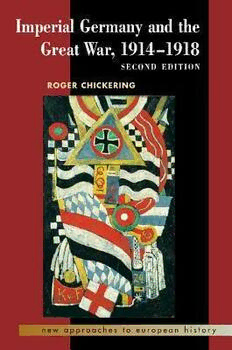
Imperial Germany and the Great War, 1914-1918 PDF
Preview Imperial Germany and the Great War, 1914-1918
Imperial Germany and the Great War, 1914-1918 This important contribution to the successful textbook series New Approaches to European History explores the comprehensive impact of the First World War on Imperial Germany. It examines military aspects of the conflict, as well as the diplomacy, government, politics, and indus trial mobilization of wartime Germany. Unlike other existing surveys, however, Roger Chickering’s also offers a rich portrait of life on the home front: the pervasive effects of “total war” on wealthy and poor, men and women, young and old, farmers and city-dwellers, Protestants, Catholics, and Jews. At the same time, Roger Chickering analyzes the growing burdens of war and discusses the translation of the hardship of war into political opposition. This excellent, well-illustrated study of the military, political, and socio-economic effects of the First World War is essential reading for all students of German and European his tory, as well as for those interested in the history of war and society. Now appearing in a second edition, this accessible book reflects impor tant new scholarship in the field and boasts an expanded and revised bibliography. Roger Chickering is Professor of History in the BMW Cen ter for German and European Studies, Georgetown University. He is an established scholar of modern Germany and is the author of Das Deutsche Reich und der Erste Weltkrieg (2002); Karl Lamprecht: A German Academic Life, 1856-1915 (1993); We Men Who Feel Most German: A Cultural Study of the Pan-German League, 1886-1914 (1984); and Imperial Germany and a W>rld Without War: The Peace Movement and German Society 1892-1914 (1975). NEW APPROACHES TO EUROPEAN HISTORY Series editors WILLIAM BEIK Emory University T. c. w. B L A N NIN G Sidney Sussex College, Cambridge New Approaches to European History is an important textbook series, which provides concise but authoritative surveys of major themes and problems in European history since the Renaissance. Written at a level and length accessible to advanced school students and undergraduates, each book in the series addresses topics or themes that students of European history encounter daily: the series embraces both some of the more traditional subjects of study, and those cultural and social issues to which increasing numbers of school and college courses are devoted. A particular effort made to consider the wider international implications of the subject under scrutiny. To aid the student reader, scholarly apparatus and annotation is light, but each work has full supplementary bibliographies and notes for further reading: where appropriate chronologies, maps, diagrams, and other illustrative material are also provided. For a list of titles published in the series, please see end of book. Imperial Germany and the Great War, 1914-1918 Second Edition Roger C hickering ggi C a m br id g e UNIVERSITY PRESS CAMBRIDGE UNIVERSITY PRESS Cambridge, New York, Melbourne, Madrid, Cape Town, Singapore, Säo Paulo, Delhi Cambridge University Press The Edinburgh Building, Cambridge, CB2 8RU, UK Published in the United States of America by Cambridge University Press, New York www.cambridge.org Information on this title: www.cambridge.org/9780521839082 © Cambridge University Press 1998, 2004 This publication is in copyright. Subject to statutory exception and to the provisions of relevant collective licensing agreements, no reproduction of any part may take place without the written permission of Cambridge University Press. First published 1998 Second edition 2004 Sixth printing 2008 Printed in the United Kingdom at the University Press, Cambridge A catalogue record for this book is available from the British Library ISBN 978-0-521-83908-2 hardback ISBN 978-0-521-54780-2 paperback Cambridge University Press has no responsibility for the persistence or accuracy of URLs for external or third-party internet websites referred to in this publication, and does not guarantee that any content on such websites is, or will remain, accurate or appropriate. Information regarding prices, travel timetables and other factual information given in this work are correct at the time of first printing but Cambridge University Press does not guarantee the accuracy of such information thereafter. For Kyle When I view the radiant valleys of our fatherland which spread out here at our feet, I can only wish: May the day never come when the hordes of war rage through them. And may the day also never come when we are forced to carry war to the valleys of a foreign people. Gustav Wyneken October 1913 Contents List of plates page xi List of figures xii List of maps xiii List of tables xiv Preface XV List of abbreviations xvi Prologue: Imperial Germany 1 1 The war begins 10 The “spirit of 1914” 13 The plan 17 Tannenberg and the Marne 23 2 The war continues 32 Bureaucratic foundations 32 Mobilizing industrial resources 35 Feeding soldiers and civilians 40 The mobilization of morale 46 The campaigns of 1915 50 Falkenhayn and Bethmann Hollweg 59 3 The war grows total 65 The land campaigns of 1916 66 Hindenburg and Ludendorff 71 The Hindenburg Program 76 Occupied Europe 82 The war at sea 87 4 The war embraces all 94 Warriors 95 Homefront and battlefront 98 Paying for war 102 War and social class 107 Gender 112 Generations young and old 119 Confession 124 Contents 5 The war breeds discord 130 The war and “culture” 132 Cold and hungry 138 Criminality and war 144 Early opposition 148 Industrial unrest: the labor movement splits 153 War aims and constitutional change 158 6 The war ends 166 “Peace feelers” 166 The enduring face of warfare 170 The Ludendorff Offensive 175 The end 180 The “stab in the back” 186 Epilogue: A great war 189 Suggestions for further reading 203 Index 223
